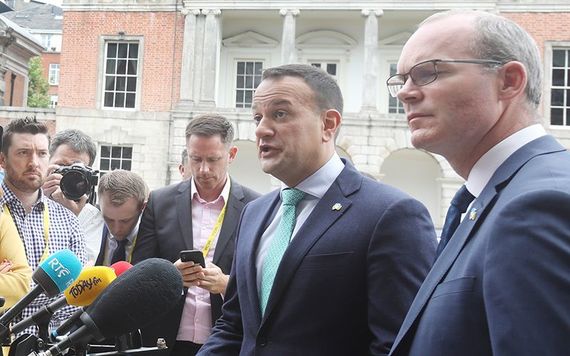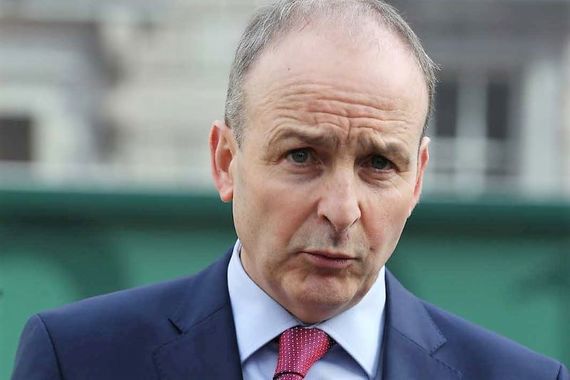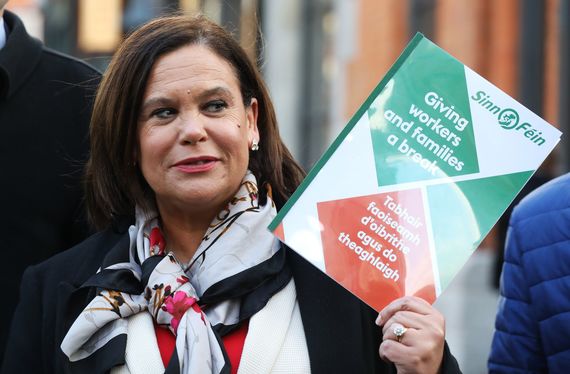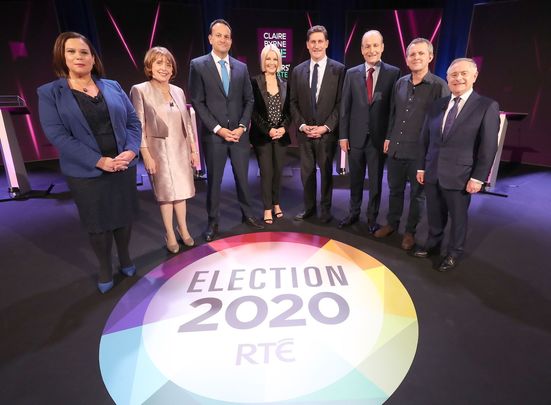A hunger for change is the order of the day in Ireland as public wants movement on day-to-day issues that affect their lives and Fine Gael feels out of touch.
We are now midway through the general election campaign here (voting is on February 8) and the outcome is on a knife-edge. The two main parties, Fine Gael and Fianna Fail, are neck and neck, with the latter a few points ahead in the polls.
It's too close to call, although every poll is showing that the momentum is with Fianna Fail.
Read more Irish politics news on IrishCentral here
Despite our booming economy and almost full employment, the national mood appears to be for a change in government. Apart from the support numbers, the polls are showing that people are dissatisfied because of unaffordable house prices, high rents, delays in hospitals, and other day-to-day issues that impact on ordinary lives.
The perception is that the Fine Gael-led government has been all about Brexit and too slow in improving these everyday issues. Many people feel they are out of touch, even arrogant.

Fine Gael leaders Leo Varadkar and Simon Coveney.
The expectation by Fine Gael that they would get a significant payback in support because of the way they handled Brexit and avoided a hard border now looks like a mistake. It has hardly registered with people. One poll last week found that only three percent of people named Brexit as an important issue for them.
This may show woeful ignorance on the part of the voters but it's a fact nonetheless - and it's probably explained by the fact that Brexit has had no impact here so far and it's hard for people to be grateful for something that has not happened.
Read more: Bidding farewell to Seamus Mallon, an unquiet Irish hero
Having said all that, the election could still go either way as campaigning intensifies in the last week and the mud really starts to fly. Either Fianna Fail or Fine Gael could yet emerge as the one with the most seats, but even then it will be far from certain which of them will lead the next government.

Fianna Fail leader Micheal Martin.
No matter what happens neither of them has a hope of getting a majority and will need the support of one or more other parties and independents to form a government. Another minority government or a coalition will be the result.
Sinn Fein are doing surprisingly well in the opinion polls, showing almost as much support as the two main parties. Also doing well is the Green Party, which is less surprising given all the concern these days about climate change, but they are still a small player.
Read more: Refusal to accept Sinn Fein in Irish government complete hypocrisy
The Labour Party is struggling, still unforgiven for its role in government in the austerity years. And the small left-wing parties and a few independents are hanging in there, although their support is weaker this time.
All of which makes it almost certain that we will emerge from this election with another rag-bag of a government, led either by Fianna Fail or Fine Gael. In a national opinion poll by The Sunday Business Post last weekend Fianna Fail was on 26 percent, Fine Gael on 23 percent, Sinn Fein on 19 percent, the Greens on eight percent and Labour on four percent.

Sinn Fein President Mary Lou McDonald.
At a time when we really need a strong and coherent government, neither of the two big parties looks like ending up in a commanding position. They will need each other or Sinn Fein plus some of the smaller players to form a majority in the Dail, and that will mean compromise and incoherence in whatever policy platform is agreed for the next government.
So what are the possibilities? The obvious one is a grand coalition between Fianna Fail and Fine Gael, a historic reconciliation of the old division that had its roots in the formation of the state a century ago.
There is very little difference between them now since they are both centrist parties with similar policies on the economy, Brexit and almost everything else, something that is proven by Fianna Fail's willingness to support the Fine Gael-led minority government over the last few years. Fine Gael has signaled its willingness to join in such a coalition but Fianna Fail is refusing to make the leap.
If Fianna Fail sticks with this -- which seems likely -- we will have another minority government, although this time it could be Fine Gael doing a confidence and supply agreement with Fianna Fail to allow them to form the administration. Both parties have ruled out going into government with Sinn Fein, which means that the Greens, Labour and some left groups or independents would also be involved. Another rag-bag, in other words.
Election campaign posters on Merrion Square, in Dublin.
All of this puts into perspective the exaggerated commitments being made by all the parties in their election manifestos. Any sense of reality or responsibility has been thrown to the wind as they promise billions in extra spending in a desperate attempt to buy votes. First prize in this race back to boom and bust has to go to Fianna Fail, although Sinn Fein are a close second.
Fianna Fail, for example, are promising that the state will top up potential home buyers savings by a third, a move that may get votes but could bring the housing market to a halt for months as buyers wait to see what happens. Sinn Fein is promising to build 100,000 social and affordable homes by, as usual, piling on taxes. Neither of their manifestos has much credibility, but that may not stop people buying into their pipe dream.
The fact is that we are still one of the most heavily indebted countries in the world and we have only just managed to get our annual budget back into balance. So where will all the money come from to support this promised spending splurge?
It's all money from the magic money tree. What the parties have done is take the Department of Finance projections for tax revenue over the five-year term of the next government which shows that there will be an extra €11 billion euro available. What we should be doing with that, of course, is paying back some of our national debt and putting the rest into a rainy day fund, not spending it.
That's if the extra revenue actually becomes a reality. Since the projections are based on continuing strong growth in our economy, a bad Brexit outcome at the end of this year or a sharp downturn in global trade could wipe out this growth and the spending bonanza all the parties are promising. It's all pie in the sky -- and that's before we factor in a likely steep fall in the corporation tax bonanza we have been getting from the multi-nationals here.
Read more: Ireland may be on the cusp of a political earthquake this election season
Fine Gael has been responsible up to now in trying to manage our economy, avoiding a giveaway budget at the end of last year even though they knew an election was coming. But they have now been stampeded by Fianna Fail into making exaggerated promises they must know are irresponsible, in health, housing and other areas where there is an outcry for extra spending. The fact is that existing policies in these areas are working, although not fast enough to satisfy the frustrated voters.
Fianna Fail's main pitch is that Fine Gael has been leading governments for nine years (the past three under Leo Varadkar) and has failed to deliver on housing and health. They have had enough time, they have failed and so we need a change in government.
That line neatly ignores the reality that after Fianna Fail crashed the economy a decade ago there was no money for the next five or six years, and instead, major cutbacks in state spending had to be made. Only in the last three or four years has there been enough of a recovery to allow spending to increase again and we have a lot of catching up to do, particularly in housing.
Fine Gael has been trying to make this argument for responsible and gradual progress. But it's a hard sell.
Much more seductive are the outlandish promises being made by Fianna Fail and Sinn Fein. People love easy, quick solutions but the truth is they don't exist for the complex problems we have here, especially in housing and health.
Fine Gael has also been drawing attention to the disastrous Fianna Fail record on the economy, and we are likely to see this intensified in the last days of the campaign. Why risk everything again by giving power back to the party that destroyed the country so much we had to be rescued by the IMF?
Fianna Fail's answer to this is to fudge what happened and rely on the fact that older voters may have forgotten and younger voters don't know about it. Fianna Fail leader Micheal Martin's line is that, yes, mistakes were made here at the time but there was a global financial crisis after the collapse of Lehman Brothers and we were caught up in that. So it wasn't all Fianna Fail's fault, you see.
This ignores the fact that it was Fianna Fail that fuelled the crazy property boom here which led to our financial collapse, an implosion so catastrophic we needed an IMF bailout to survive and the Troika had to come in to run our economy for three years. Yes, Ireland was affected by the global financial crisis at the time, like other countries where banks were in trouble. But I don't remember the IMF having to give a bailout to the U.S. or the U.K., do you?
On top of this dire party history is the fact that Martin (despite his nickname the Altar Boy) has a dubious personal record. He came into the Dail in Charlie Haughey's time and he was in the Cabinet right through the boom years. He is also a former minister for health. It's hard to believe he had no responsibility for the country going bust, despite his latter-day holier than thou attitude.
This is going to be a fascinating election to watch as voting day approaches. The outcome will say much about our maturity as a people and a country.
Read more: New bridge named after JFK's mother opens in Ireland




Comments